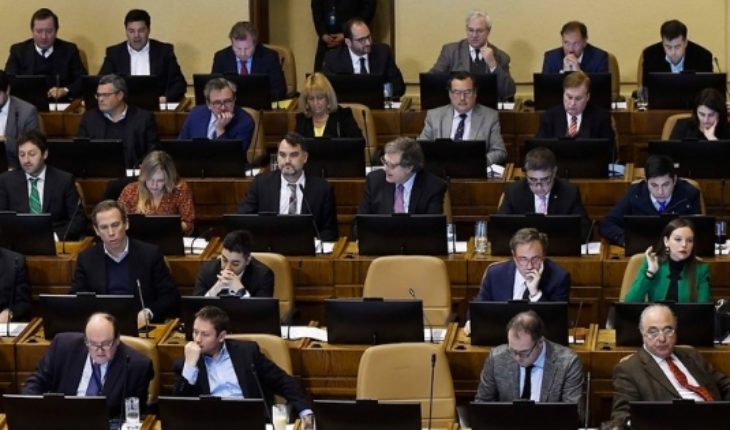President Sebastián Piñera is expected to make the announcement on Monday to move towards an agenda against economic abuse and crime, one of the citizen demands within the framework of the mobilizations that have taken place in the country since October 18.
In view of this situation, deputies from the National Renewal (RN) bench and the Independent Democratic Union (UDI) submitted some letters.
According to Emol, RN unveiled an agenda called “No + Abuses” by proposing the “people’s advocate” figure, which would have the role of ensuring that the services it provides meet sits of efficiency standards.
It should be mentioned that the Sernac is the one who possesses this role in the case of consumer abuses, however, when the breach is the fisco there is no regulatory body:
1.- Within the “abuses” that the State may commit against consumers and which is in search of completion, RN parliamentarians proposed these eight initiatives.
2.- Renegotiate contracts with motorway concessionaires: With this, we want to abolish the differentiated rate by schedule, establish the payment for the tranche actually used and waive the unpaid fines and interest.
3.- In the field of telecommunications, mobile phone companies will be required to report the existence of the same plan at a lower price
4.- Regulate the minimum payment of credit cards: In this regard, Members explained that “today when a credit card statement is issued, a ‘minimum payment’ is incorporated. This collection suggests that it is an expense that must be incurred to avoid fines and repay the debt. However, the reality is that this payment will not necessarily reduce the amount owed, but will cover interest, commissions and taxes.”
5.- Extend until April 30 the payment of the driving licence, since “March is a complicated month for most Chileans and the main affected is the pocket”, they noted.
6.- “Dicom Forgiveness” for unpaid debts as of October 1 in amount ing amounting to $3,500,000.
7.- Establish a new conventional maximum rate that incorporates vulnerability criteria. This is because “today interest rates – such as the conventional maximum rate – are formulated considering market conditions, without making any consideration for people,” they explained.
8.- Protection of members of isapres. What official MPs are looking for is to “enforce the consumer protection law, which could be an important step.”
9.- That banks are responsible for cyberattacks on consumers.
With regard to the abuses committed by companies, RN proposed:
1. Increase penalties for economic offences, especially those relating to collusion, tax evasion, bribery and bribery, and therefore propose to aggravate the penalty of crimes of collusion to its maximum degree (5 to 10 years); aggravate penalties for stock crimes, such as the use of insider information, aggravating the penalty for irregular financing in politics and the limitation of this crime in two years; senators and deputies are explicitly obliged to report criminal acts they are aware of; and the prohibition of persons convicted of corruption or other wise crimes from having managerial or administrative positions in companies that work with the state.
2. Establish “real 30-day payments without small print”, prohibiting contracts between large enterprises and SMEs from stipulated to fulfil their obligations beyond the effective 30 days.
3. Finally, parliamentarians proposed that in retail, offers related to means of payment involving credits can be accessed, offering the same discount by paying cash as well.
The UDI also proposes
In the meantime, the UDI did the same and proposed a series of measures to “stop state abuses” and “strengthen private relations.”
Emol also revealed the UDI minutes, which seek to facilitate, transparent and improve the relationship between companies, whether state or private, and citizens who make use of them.
The UDI argues that “state equipment is as responsible as individuals for a series of abuses that are committed on a daily basis.” It therefore proposes three measures to improve the State:
1.- Strengthen the powers of the main auditbodies. Deliver better control tools to the FNE, Sernac and Superintendences.
2.- Require the State as a whole and municipalities to pay their suppliers 30 days as must private companies.
3.- More efficient policies for auditing municipalities. Today they lend themselves to “multiple acts of corruption.” So the challenge is to demand higher rates of transparency and control of these entities.
Finally, with regard to the private sector, the community stressed that “the control and control work to which they are now subject must be strengthened.”
1.- Increase penalties for legal representatives of legal persons who commit acts of collusion of goods and services of first need.
2.- Pro-Consumer: It is suggested to move forward in reducing possible problems of interpretation of the Consumer Law (such as the choice between legal and voluntary guarantee, which today has had to be resolved by the courts of justice). It is also proposed to stop consumer abuses of contracting services. So, if, for example, you want to hire a cable TV and internet service over the phone, “the logical thing is that you can unsubscribe by the same means,” says the minutes you accessed this medium.
3.- Increase sanctions to those companies that incur a lack of service especially when they provide goods and services of first need.
translated from Spanish: RN and UDI get ahead of Piñera and present “anti-abuse agenda” to combat economic crimes
December 7, 2019 |





